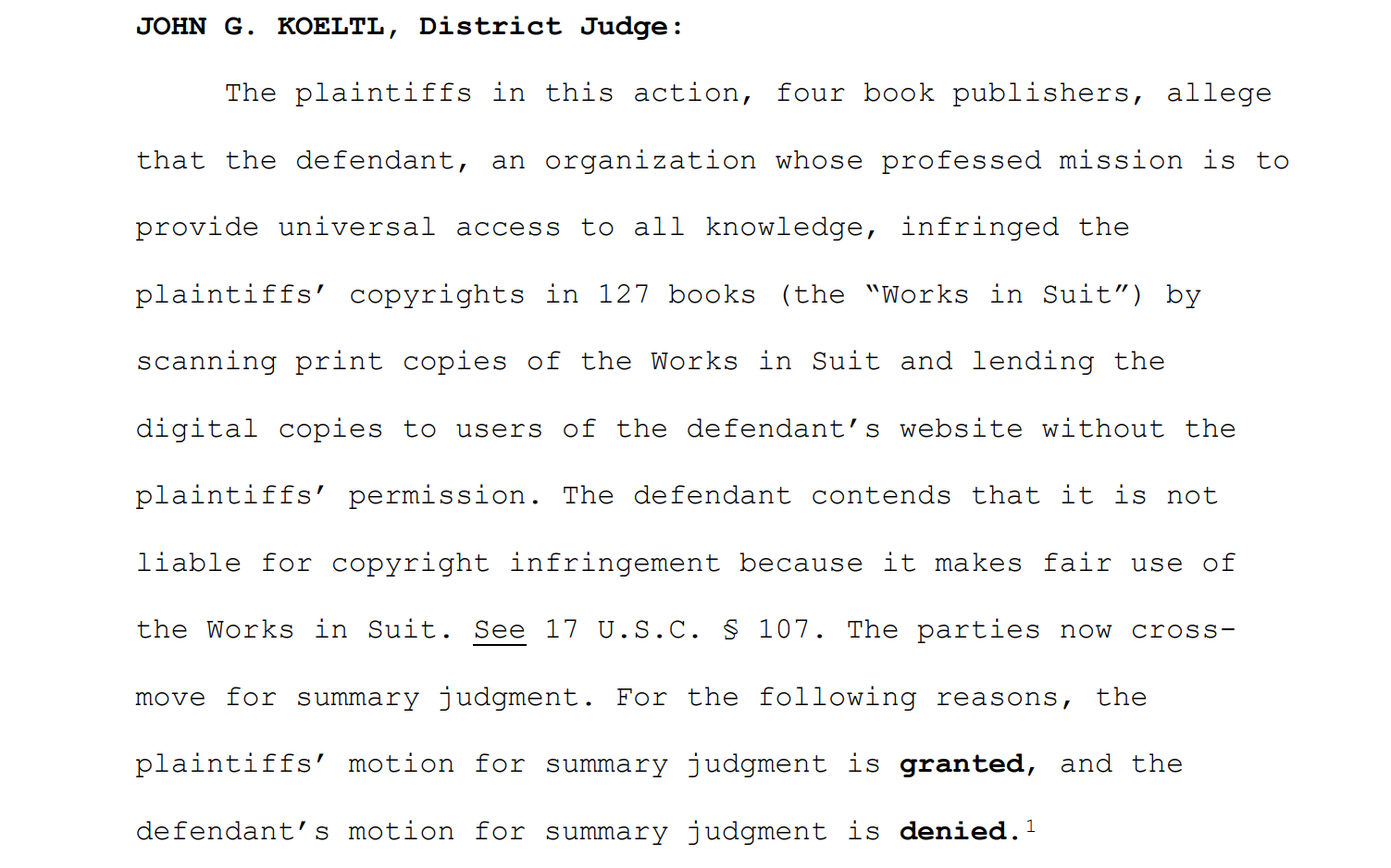In 2020, publishers Hachette, HarperCollins, John Wiley and Penguin Random House sued the Internet Archive (IA) for copyright infringement, equating its ‘Open Library’ to a pirate site.
IA’s library is operated by a non-profit organization that scans physical books and then lends the digital copies to patrons in an ebook format.
While ‘digital’ book lending is not uncommon, libraries typically loan out DRM-protected files after acquiring a license from publishers. In this case, IA sent physical books it owned to a scanning facility and made its own copies.
Fair Use or Mass Copyright Infringement?
These digital copies were subsequently loaned out to patrons, with IA ensuring that only one person at a time could access a single digital copy of a single physical book.
IA previously sought summary judgment in its favor, arguing that a digital copy of a physical book ‘transforms’ the original work, with lending limits and the absence of profit also supporting a finding of fair use.
In contrast, the publishers described IA’s library as a rogue operation engaging in willful mass copyright infringement. Claiming direct damage to their bottom line, the publishers’ lawsuit aimed to put an end to the “illegal” lending program once and for all.
The publishers went on to request summary judgment and a declaration that this type of copying is a clear case of copyright infringement.
Opinion and Order
Earlier this week, the parties had the opportunity to back up their arguments during a New York Court hearing. District Court Judge John Koeltl questioned both sides on their summary judgment requests, before deliberating on his final decision.
After weighing the arguments. Judge Koeltl published his opinion and order yesterday. His order clearly sides with the publishers, whose request for summary judgment was granted. IA’s fair use defense and summary judgment in its favor was denied.

Courts typically weigh four factors when determining fair use. Judge Koeltl concludes that all four factors weigh strongly in favor of the publishers.
Starting with the first factor – whether the use is transformative – the order stresses that IA failed to show that its book lending operation meets the standard. The fact that only one patron at a time can borrow a book is irrelevant to the fair use question, the order notes.
“The crux of IA’s first-factor argument is that an organization has the right under fair use to make whatever copies of its print books are necessary to facilitate digital lending of that book, so long as only one patron at a time can borrow the book for each copy that has been bought and paid for,” Judge Koetl writes.
“But there is no such right, which risks eviscerating the rights of authors and publishers to profit from the creation and dissemination of derivatives of their protected works.”
The court fails to see how IA’s operation transforms the original work. The fact that IA is a non-profit organization isn’t a strong defense either, as the lending program still allows IA to benefit through donations and other means, without obtaining an appropriate license from the publishers.
“IA’s wholesale copying and unauthorized lending of digital copies of the Publishers’ print books does not transform the use of the books, and IA profits from exploiting the copyrighted material without paying the customary price,” Judge Koetl notes.
Competing With Free?
Profits and revenue are also relevant in determining the fourth fair use factor, which questions whether the library affects the original book market and existing revenues.
IA argued that this isn’t the case, as sales volumes fail to show a negative correlation with its lending service. Unconvinced by the argument, Judge Koetl says that IA’s program amounts to direct competition for licensed alternatives.
“In this case, there is a ‘thriving ebook licensing market for libraries’ in which the Publishers earn a fee whenever a library obtains one of their licensed ebooks from an aggregator like OverDrive.
“This market generates at least tens of millions of dollars a year for the Publishers. And IA supplants the Publishers’ place in this market.”
IA’s library offers a vastly cheaper alternative to licensed platforms, which allows libraries and the public to save money. However, it does so at the expense of the publishers and their authors, according to the court.
“It is equally clear that if IA’s conduct becomes widespread, it will adversely affect the potential market for the Works in Suit,” Judge Koetl writes.
IA is Liable for Copyright Infringement
Since the remaining fair use factors weigh clearly in favor of the publishers, IA’s fair use defense fails. As a result, the court concludes that the Internet Archive is indeed liable for copyright infringement.
The scale of the damages has yet to be established. IA asked for statutory damages to be remitted, citing its status as a nonprofit library. Judge Koeltl says that at this time, any decision on damages is premature.
Based on this order, it’s clear that IA’s ebook lending library won’t be allowed to continue in its current form. That said, the Archive still has the option to appeal.
In response to the order, IA’s Director of Open Libraries, Chris Freeland, confirmed that an appeal is forthcoming.
“We will keep fighting for the traditional right of libraries to own, lend, and preserve books. We will be appealing the judgment and encourage everyone to come together as a community to support libraries against this attack by corporate publishers.”
From: TF, for the latest news on copyright battles, piracy and more.
Source : Internet Archive is Liable for Copyright Infringement, Court Rules








